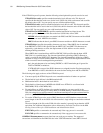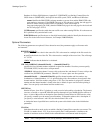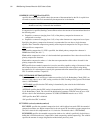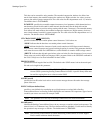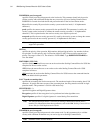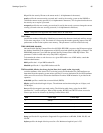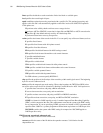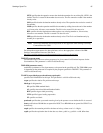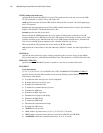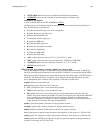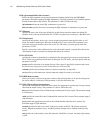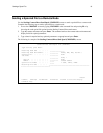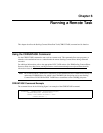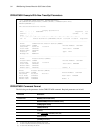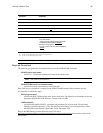
88 IBM Sterling Connect:Direct for i5/OS User’s Guide
TLINK(vmid,pwd,accmode,cuu)
specifies the disk where the CMS file is located. This parameter allows the user to access the CMS
file. This parameter is valid for VM or VSE nodes only.
vmid specifies the owner ID for the CMS minidisk where the file is located. The valid length ranges
from 1–8 characters.
pwd specifies the appropriate password for the CMS minidisk where the file is located. The maximum
length is 256 characters. The default password is ALL.
accmode specifies the link access mode.
When used with the FROM parameter, the access modes are W (primary read/write access), M
(primary multiple access), R (primary read only), RR (primary and secondary read only access), WR
(primary read/write access; alternate read only access), MR (primary multiple access; alternate read
only access), and MW (primary multiple access; alternate read/write only access).
When used with the TO parameter, the access modes are W, M, and MW.
cuu specifies the virtual address of the disk where the CMS file is located. Any three-digit number is
valid.
TMSVGP(n)
specifies the remote file mass storage volume group that resides on a mass storage system (MSS)
device, which must be a valid DD (data definition) name. This parameter is valid for z/OS nodes only.
TPROTCT(*YES|*NO
)
specifies whether an IBM RACF profile is created for a new file on a remote VM system.
TRACEOPT
Trace Instructions
(L, S, F, C, X, K, D, H, V, W, P,|*NONE|*ALL|*EXT| *COMMON|*INITPARMS|*CURRENT
specifies the trace bits that define functions to be traced by Sterling Connect:Direct for i5/OS. The
following are valid options:
L enables the main line logic trace for all components.
S enables the Process step logic trace.
F enables the file handler trace.
C enables the communications logic trace.
X enables the XDR trace.
K enables the KQV logic trace.
D enables the all-purpose data dump.
H enables the FMH dump.
V enables the XDR dump.
W enables the communications dump.
P enables the CIPC dump.
*NONE turns off all traces.
*ALL enables all product traces.(L, S, F, C, X, K, D, H, V, W and P)
*EXT enables all product traces plus two system traces (TRCICF and TRCJOB).
*COMMON enables the communications traces. (L, S, F, C, and H)



